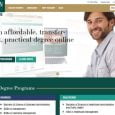Getting an online degree can be a major investment. But there are other ways to learn online without spending a dime.
Jonathan Payne, a marketing coordinator at the University of Louisville in Kentucky, has taken several free online classes. His coursework led to certifications in Google Analytics and Adwords, and he has dabbled in programming on websites like Codecademy and edX.
When it comes to coding, the 27-year-old says, “It’s just something I’ve always wanted to learn. It helps a little bit in my job but not enough to make me want to pay $8,000 to $10,000 to get a master’s degree or another bachelor’s degree.”
[Discover three ways to gain coding skills through online learning.]
Payne isn’t alone. Adult learners may take free online courses for a number of reasons. Many options exist, including massive open online courses, or MOOCs, that companies such as edX and Coursera create in collaboration with universities. MOOCs are essentially recorded lectures that students can audit for no fee, though paying may provide features such as additional instructor feedback.
Other free options across disciplines are available on various university and company websites. Some are academically focused; others teach soft skills such as organization and communication.
Experts say completion rates are generally lower in free online courses than in those where students pay for credentials.
But Glenn Kleiman, a professor and executive director of the Friday Institute for Educational Innovation at North Carolina State University—Raleigh, which offers MOOCs for educators, says, “Our courses are designed around principles of self-directed learning. So we look for people to be able to navigate to get what they need from it – not what we think they should have.”
Here are four instances where it may make sense to consider a free online course.
1. To gain specific career-relevant skills: Mike Feerick, CEO and founder of Alison, a website for free online classes in a range of subjects, says completing free online coursework can help adult learners improve their resumes by showcasing relevant knowledge to current or future employers.
[Discover how to choose the right online program to boost your resume.]
These online courses, experts say, also enable employees to keep their skills up to date – particularly in fields like information technology that are constantly changing and evolving.
Payne says he completed several online lessons and assessments to earn his digital certifications in Google Analytics and Adwords, and he can now mention these credentials when he speaks with employers about his experience. But to stay certified and illustrate that he isn’t behind the times, he will need to retake exams in the future, he says.
One Twitter user, who oversees online learning and library services for a California public school district, gives another example of taking a free online course to gain industry-specific skills:
2. To supplement a degree program: Feerick says free online classes shouldn’t necessarily replace what current degree-seeking students – whether online or on campus – are learning at their college or university. But if students find a particular course challenging, additional insight into the topic at no charge can’t hurt, he says.
3. To sample an online course or program: Enrolling in a free online class can help prospective online degree students determine whether online learning is right for them, experts say. They may also consider starting a MOOC from a specific university, for instance, if they want to preview online courses with a certain instructor or eventually move forward with a paid version of the class.
MOOCs on edX and Coursera require students to pay between $30 and $150 if they want a certificate of completion. The option to audit the classes beforehand allows them to preview the coursework before committing, says Anant Agarwal, CEO of edX and a professor at the Massachusetts Institute of Technology.
[Explore five differences between MOOCs and online degree programs.]
“They can try it out to see if the rigor level matches their background,” he says. “So really, it’s to kind of dip their toe in the water to sample it, and then if they like it, they can then go in for the certificate option.”
4. To pursue an interest: “There are a lot of learners that might be retired or that might be looking to do something completely for fun,” says Agarwal. Not every online learner, he adds, pursues education for career-related reasons.
Payne, the student from Louisville, says he took free online programming classes in part because he has considered eventually transitioning his career to web development or a related industry. His intent: “Just to kind of get a taste before I go straight in and enroll in a costly program,” he says.
[“Source-timesofindia”]



